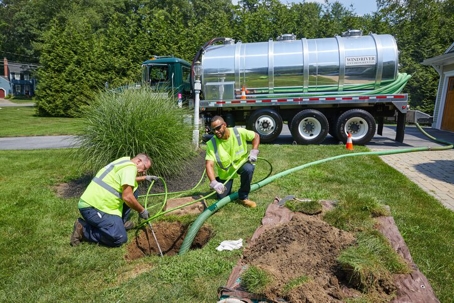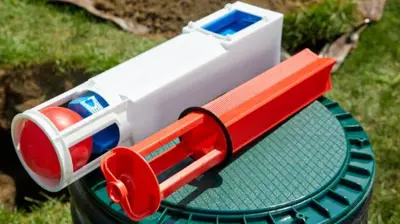Table of Contents
- Why Septic System Care Matters
- Understanding Your Septic System
- Septic System Dos and Don’ts
- The Benefits of Septic Maintenance
- Regional Septic System Care
- When to Schedule Your Septic and Sewer Inspections
- Easy Septic Maintenance Tips
Whether you’re a seasoned homeowner with years of septic system experience or are brand new to septic living, this guide will help protect your investment and keep your home running smoothly.
Septic systems don’t have to be intimidating or mysterious. They’re just a different kind of plumbing, but they require a little more care, attention, and understanding.
At Wind River Environmental, we know that the right knowledge can save you stress, money, and messy surprises.
Why Septic System Care Matters
A well-maintained septic system works quietly behind the scenes, treating your household wastewater and returning clean water to the environment.
Neglecting care, even by accident, can cause major headaches: expensive repairs, unpleasant odors, slow drains, and the nightmare of a failed drain or leach field (which can cost over $20,000 to replace).
When you understand your system, you can spot problems early and avoid shortcuts that lead to big bills later. Plus, you protect your property, your neighborhood, and your environment.
Understanding Your Septic System: The Septic Tank & Drain Field
For new homeowners, here are the basics:
- Septic Tank. This underground tank separates solid waste from wastewater. Natural bacteria break down solids, while liquids flow out to the next stage.
- Drain/Leach Field. Also called a soil absorption field, this network of pipes distributes wastewater safely into the soil, where it’s further filtered and purified.
Many people don’t realize the leach field is crucial, expensive to replace, and extremely sensitive to how you care for your system.
Septic System Dos & Don’ts
A little knowledge goes a long way. Stick to these simple habits, and you’ll help your system last for decades.
The Dos
- Spread out laundry days. Too much water at once can overwhelm your tank and leach field.
- Keep a septic record. Record tank location, dates of pumping, and any repairs for future service.
- Schedule regular septic pumping. Your septic tank is not "out of sight, out of mind". Schedule pumping every 2-3 years or as recommended for your tank size and household.
- Use water wisely. Install low-flow toilets and showerheads to reduce stress on your system.
- Clean lint traps and check moving parts. Regularly clear lint filters on your washing machine and monitor things like pumps and alarms.
- Direct roof and surface water away. Keep rainwater gutters and drains from washing into your leach field.
- Use septic-safe products. Liquid, biodegradable, and low-phosphate soaps are best. Use single-ply toilet paper labeled “septic safe” or “biodegradable.”
- Run water in infrequently used drains. This helps prevent sewer gases and indoor odors.
- Clean Your Septic Tank Filter. The septic filter (also known as the effluent filter) helps catch solids before they reach the drain field, but it only works if it’s kept clean. Check and clean the filter about every six months.
- Know where your septic tank is located. Knowing where your septic tank is makes routine inspections, filter cleaning, and pumping much easier. If you’re not sure where yours is, visit our blog on how to locate your septic tank.
- Know how to check if your septic tank is full. Yes, you can check how full your septic tank is (if your conditions are right, it's not as hard as it sounds!).
The Don’ts
- Don’t overload with water. Avoid running many loads of laundry in one day, and never connect sump pumps to the septic system.
- Don’t flush anything but waste and toilet paper. Even “septic safe” labeled wipes, cat litter, feminine hygiene, paper towels, or condoms can block or damage your system.
- Don’t pour fats, grease, or chemical cleaners down the drain. These can kill good bacteria or clog the system and leach field.
- Don’t plant trees or shrubs near the leach field. The roots can invade and clog pipes.
- Don’t drive or park cars over the tank or field. This can crush pipes and compact the soil, reducing the drain field's effectiveness.
- Don’t use a garbage disposal. Food particles don’t fully break down and can cause clogs.
- Don’t ignore slow drains or odors. These are early signs of trouble and mean you should call for service.
For a printable checklist and complete list, including what not to flush, see Wind River Environmental’s Septic System Dos and Don’ts.
The Benefits of Proper Septic Maintenance
Taking care of your septic tank directly impacts the health and longevity of your leach field.
Solids that aren’t pumped out can escape, clog pipes, and quickly ruin the field. Once that happens, repairs are expensive and disruptive.
Routine maintenance includes:
- Regular Pumping. Have your system pumped every 2-3 years, or more often for larger households.
- Add Bacteria Additives (if recommended). Some tanks benefit from bacterial boosters that help break down solids.
- Use a Septic Tank Filter. Also known as effluent filters, these catch solids that could otherwise damage your leach field.
- Visual Inspections. Periodically check for soggy spots, odors, or slow drains.
- Maintenance Records. Keeping a log of service protects you if you sell your home and helps with future maintenance.
Regional Septic System Care: What You Need to Know
While septic system basics are the same throughout the U.S., climate and soil can affect how you care for your system.
Consider the type of septic system care needed for these regions:
- Northeast/Cold Climates. Insulate pipes and tanks (with mulch in the fall) to prevent freezing. Pump tanks before winter if you’re in a cold spot.
- The Carolinas. Watch for heavy rains that can saturate your field, always direct surface water away.
- Florida. Sandy soil drains fast, and leach fields here can be sensitive to high water tables and pests. Maintain a grassy cover and avoid chemical lawn treatments above the field.
Following general best practices will help regardless of your region, but ask your local experts at Wind River Environmental for any special care tips for your area.
Schedule Septic and Sewer Inspections Before You Buy (or Sell) a Home
A septic system can hide costly problems underground. Before buying a home, schedule two separate inspections.
These inspections should include:
- Septic System Inspection. A specialist checks the tank, baffles, filter, connections, sludge level, and looks for cracks or leaks.
- Sewer Line Inspection. This is especially important in older houses. It checks the buried pipes running from the house to the tank (or to municipal sewer lines) using a camera if possible.
Having a septic inspection can reveal issues early, save you thousands, and prevent you from inheriting a big (and expensive) surprise.
Easy Septic Maintenance Tips for Long-Term Benefits
At Wind River Environmental, we’re passionate about educating homeowners (new or experienced!) so you feel empowered, not anxious, about your septic system.
Here are a few friendly tips for long-term system health:
- Make a maintenance plan. Commit to regular pumping and keep those records handy.
- Educate your family. Share the dos and don’ts so everyone can work together to keep your septic system operating well.
- Monitor your system. Pay attention to slow drains, odors, or lush grass over the leach field; these can signal trouble.
- Don’t skip maintenance to save money. The cost of pumping or annual checks is far less than the cost of replacing an entire system.
Your septic system quietly works behind the scenes every single day. With just a little mindfulness and good habits, you can avoid costly mishaps, help your investment last, and keep your home and environment healthy.
If you want more detailed tips or have questions about your system, find your closest location or schedule a service appointment today!




